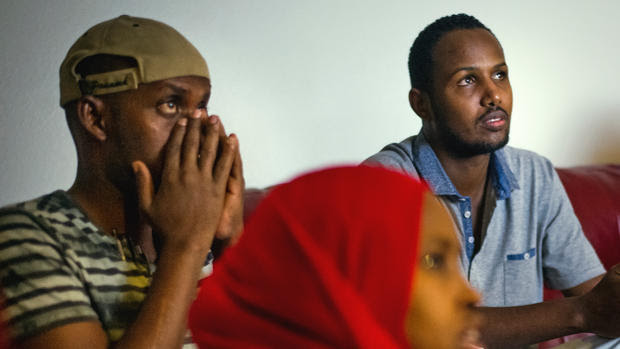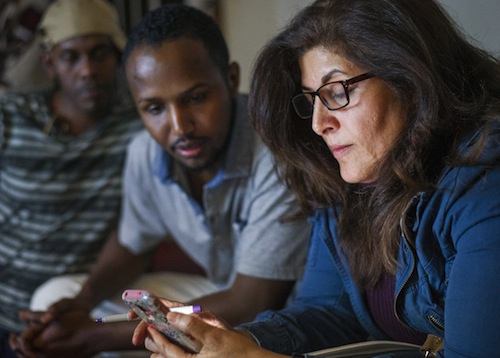| Hello Jeff - The media is already backing
down from the TRUTH that about 22% of new refugees called 'Syrian refugees'
(but they are not they are from Sub Saharan African and West African)
have TB. I woud venture to say that 22% is a conservative
number that are TB infected. In Minnesota, they took in refugees
from Myanmar which was once called Burma. They too have a high incidence
of TB and other diseases. The Myanmar people have a habit of spitting
on public sidewalks, floors, etc, and they refuse to stop. This
is a sure way to spread TB to others.
I cannot understand why we are bringing in millions of these third world
people. It is time to send them all home while at the same time
removing our soldiers from their countries. An equal exchange. The
military in the US can be used on our borders. America First!
The Muslims claim they attack us because the US military is in their countries.
So now, give them what they claim they want, remove our troops from their
countries. Then we leave and we also stop supplying them with guns
and money. No more money to Israel, either.
Patty
Do These Look Like 'Syrian' Refugees To You?

Cani Abdullahi, left, reacts to a Valley News Live report with friends
Hamida Dakane and Hukun Abdullahi who gathered in a Fargo apartment on
Monday, May 16, 2016, to watch the report by the news station's "immigration
and relocation" reporter Bradford Arick targeting the local refugee population
as "health risks" to those living "in a refugee resettlement area." Nick
Wagner / The Forum
FARGO A few minutes before a local TV station aired a story about the
supposed tuberculosis risk posed by refugee resettlement, four New Americans
gathered around a TV in a south Fargo apartment, cracking jokes.
But when the story came on, their faces went from jovial to pained.
The
Valley News Live story, which aired Monday, May 16, claimed "everyone"
living in "refugee resettlement areas" was at risk for contracting tuberculosis.
An on-screen graphic for the story asked: "Could kindness be bad for your
health?" The answer, according to the report, was yes.
Letter:
KVLY reporter didn't tell the truth
Forum editorial: TV
'news' report an outrage
However, health officials in North Dakota and Minnesota say that isn't
true. And New Americans in Fargo-Moorhead said they believe the report
stoked fears about refugees, a group that is medically screened before
entering the U.S.
The report created "hate and fear between the community," Hukun Abdullahi,
21, said shortly after watching it Monday night. He came to the U.S. from
Somalia and runs the Afro-American Development Association in Moorhead.
"It is very dangerous," he said. "Because right now, most of the locals,
some of them who don't know about all this process, when they see us they
may be scared."
'Not a major problem'
Valley News Live's
story said "the rates of tuberculosis infections are rising for the first
time in nearly 20 years, and the evidence points to people coming overseas
to the United States. Our own investigation has found that everyone, U.S.
born or foreign born, who lives in a refugee resettlement area is at risk
for contracting tuberculosis."
The TV report exposed "a health crisis" affecting "thousands of our viewers,"
Valley News Live General Manager Jim Wareham wrote in an email to a viewer
who was upset by the story.
But health officials disagree.
Dr. John Baird, health officer at Fargo-Cass Public Health, watched the
story and said it was wrong. He said refugees do not pose a public health
risk with tuberculosis. He said the bacterial disease is "not a major
problem for our community."
"I'm not going to say anything to refute a doctor," Valley News Live News
Director Ike Walker said Tuesday in an interview with The Forum when told
about Baird's assessment. "I mean the reality is, the numbers stand on
their own, the reporting stands on its own."
Asked if living in a refugee neighborhood would pose a health risk, North
Dakota Department of Health tuberculosis expert Dee Pritschet said, "I
don't know why it would be."
Related:
McFeely: What if you stage a protest and nobody shows up?
North Dakota has one of the lowest rates of tuberculosis in the country:
1.19 cases per 100,000 residents. In 2015, it had a lower rate than 44
states and the District of Columbia. There were nine cases of active tuberculosis
in North Dakota that year, down from 15 cases in 2014.
Minnesota has a higher rate than North Dakota—2.73 cases per 100,000 residents—but
remains below the national average. Minnesota saw 150 cases in 2015, up
from 147 cases in 2014.
In the U.S., foreign-born people have a higher rate of tuberculosis than
the population as a whole. Preliminary data from the U.S. Centers for
Disease Control and Prevention says that in 2015, about 15 cases per 100,000
were foreign-born. The overall rate was just under 3 per 100,000.
Foreign-born people have a higher rate because they come from other countries
where the disease is more common. Baird said that of the tuberculosis
patients he receives, refugees form the "larger group of people that we
take." But he added that "not all of our cases in tuberculosis are in
refugee patients."

Cani Abdullahi, left, and Hukun Abdullahi look to Fauzia Haider's phone.
Nick Wagner / The Forum
"Really, our state and our community has a very low rate of tuberculosis
compared to other areas of the country," he said.
Health officials say tuberculosis is low on the list of diseases Americans
should be worried about. It's spread through the air but not highly contagious,
unlike measles or influenza, said Doug Schultz, spokesman for the Minnesota
Department of Health.
To get infected "requires prolonged, close contact," he said. "Just being
in the proximity of someone with tuberculosis, you're considered a low
risk."
Worldwide, it is the most lethal infectious disease, killing 1.5 million
people in 2014. But in the U.S., being infected is rare.
In 2015, there were 9,563 cases in the U.S., according to a preliminary
CDC report issued in March. It was an increase from 2014, which had 9,406
cases. In the 1950s, there were roughly 60,000 cases a year.
The recent uptick nationwide is a concern for health officials, Pritschet
said. She said there is a growing push to treat people who have latent
tuberculosis, a form of the disease where the person doesn't have any
symptoms and isn't contagious.
Latent tuberculosis can eventually become active tuberculosis, especially
if a person's immune system is compromised. The CDC does not keep data
on latent tuberculosis, Pritschet said.
Of the nine active tuberculosis cases in North Dakota last year, eight
were foreign-born. One of the nine died. There were also 335 cases of
latent tuberculosis.
The reason for the recent uptick in total U.S. cases is not yet clear,
she said. There was a decrease in foreign-born cases and an increase in
U.S.-born cases.
Medical screening for refugees
Refugees are screened for health problems before entering the U.S. and
again upon entry. They are tested for tuberculosis and are not allowed
entry if they have active tuberculosis.
Jessica Thomasson, the CEO of resettlement agency Lutheran Social Service
of North Dakota, said she is confident in the "extensive medical screening"
refugees undergo.
"So we don't see active tuberculosis as a health risk among new refugees,"
she said.
New Americans in the Fargo-Moorhead area described the strict screenings
they were required to go through before coming here.
"They take a picture of your lungs ... they take your blood, they check
if you have HIV, they check you all," said Fowzia Adde, a refugee from
Somalia who lives in West Fargo. "You go through health testing and then
when you come to Fargo, again they put you through health testing."
Refugees are not required to be vaccinated against tuberculosis. The tuberculosis
vaccine has not been proven to be effective, and it's not used in the
U.S., health officials say.
Hamida Dakane, 27, a Fargo resident who came from Kenya on a green card,
said the medical checks she went through to come to the U.S. were so stringent
they felt like a punishment, and she assumes refugees go through even
more scrutiny.
"It is intense," she said. "You cannot get away with anything."
The U.S. does not block people who have latent tuberculosis because it
"is extremely common in the rest of the world and it's not contagious,"
Baird said.
Health officials acknowledge latent tuberculosis can become active. Schultz
said that happens 5 to 10 percent of the time.
"Can we really humanely not allow them to come to the U.S. because of
a disease that they might possibly develop?" he said. "We have individuals
in the U.S. who travel to countries all the time where other infectious
diseases are common and they can certainly bring those back with them.
... That's probably a greater risk than allowing refugees who may have
latent tuberculosis."
Disease as 'entertainment'
May is a sweeps period, an important month in television when ratings
are measured, and some New Americans said they believe the report on the
supposed risks of tuberculosis among refugee populations played into people's
fears to get more views.
"You know, it's like people just having a disease become an entertainment
for them," Hukun Abdullahi said.
Fauzia Haider of Fargo, who came to the U.S. from Pakistan on a visa,
called it "fearmongering."
"Is the Centers for Disease Control sleeping, if there's such an epidemic
going on like they're portraying?" she asked.
She said the story could make people wary of interacting with people they
suspect of being refugees.
"If they go to a Somali restaurant, they'll think maybe there's infected
people here and you should not go here. And if there's Somali kids studying
in schools, they'll tell their kids to stay away from them, that they
might have tuberculosis," she said.
The story has helped popularize a nickname for the station among New Americans—"Come
watch 'Valley Hate Live,' " Hukun Abdullahi told one of his friends before
the story aired. And it's not only immigrants who are upset.
Brie Blackburn, a 28-year-old marketing coordinator in Moorhead, emailed
the station to complain that it was "purposefully singling out people
and creating fear for them."
The response she received from Wareham, the general manager, had the subject
line "Get a grip."
"Brie, Thousands of our viewers are facing a health crisis that no one
told them was happening. Sorry their danger is inconvenient to your political
narrative," Wareham wrote in the email, which Blackburn provided to The
Forum.
"When you start implanting these kinds of views that can be so negative
and taken in such the wrong context and put it back to the days where
people feel that segregation is the best to keep their kids safe or keep
their families safe, it just pushes Fargo way, way back into ages that
nobody wants to go," Blackburn said.
Asked about the accusations of fear-mongering, station news director Walker
said, "I will tell you that all we did was report the numbers from the
state of Minnesota, state of North Dakota and from the CDC."
Haider said the backlash was "very heartening." "What I'm encouraged by
is the people's reaction to this story," she said. "They were all appalled
by it."
Forum Communications Co., which owns The Forum, also owns Fargo television
station WDA
http://www.inforum.com/news/4034964-refugees-health-officials-dispute-fargo-tv-report-suggesting-refugees-carry-tb-risk |

